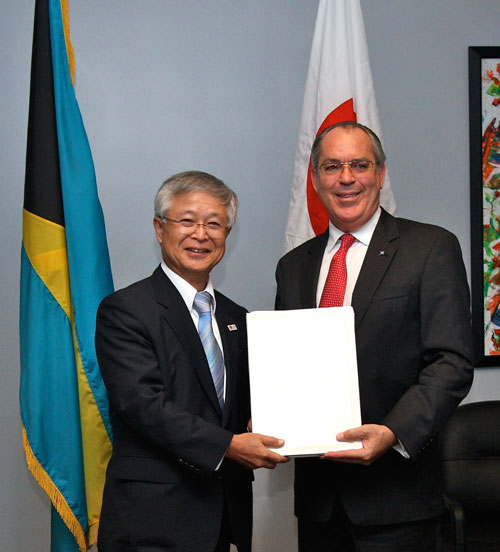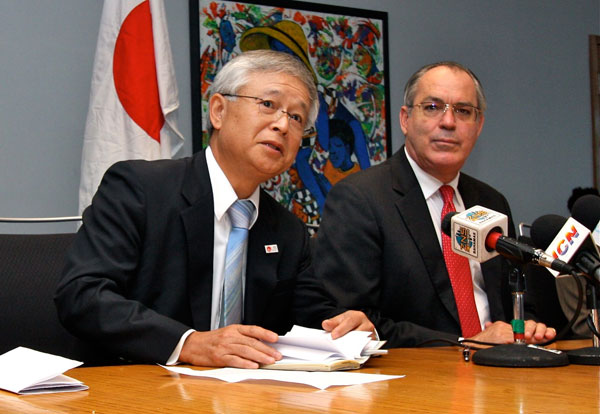
The Government of The Bahamas and the Government of Japan signed an Agreement for the Exchange of Information for the Purpose of the Prevention of Fiscal Evasion and the Allocation of Rights of Taxation with Respect to Income of Individuals, during a ceremony on Thursday, January 27, 2011. Pictured from left are His Excellency Hiroshi Yamaguchi, Ambassador of Japan; and Deputy Prime Minister and Minister of Foreign Affairs, the Hon Brent Symonette, addressing the media.
(BIS Photo/Kris Ingraham)
|
NASSAU, The Bahamas - The Government
of The Bahamas and the Government of Japan signed an Agreement for the
Exchange of Information for the Purpose of the Prevention of Fiscal
Evasion and the Allocation of Rights of Taxation with Respect to Income
of Individuals, during a ceremony on Thursday, January 27, 2011.
This made the 23rd TIEA that
The Bahamas has signed and marked its second with a major Asian economy.
The Bahamas has TIEAs with 17 Organisation for Economic Cooperation
and Development member countries and nine with members of the G-20.
The signing took place at the
Ministry of Foreign Affairs, where Deputy Prime Minister and Minister
of Foreign Affairs the Hon. Brent Symonette signed on behalf of the
Bahamas Government and His Excellency Hiroshi Yamaguchi, Ambassador
of Japan signed on behalf of his government.
Mr. Symonette said that the
Government of The Bahamas welcomed the conclusion of this agreement
with Japan, a fellow active participant in the ongoing work of the Organisation
for Economic Cooperation and Development Global Forum on Transparency
and Tax Information Exchange, as well as in the previous Committee on
Level Playing Field Issues.
“The Government is confident
that with the continued strategic broadening and deepening of its tax
cooperation network the country will continue to grow and prosper as
an international business centre of choice for global citizens,” Mr.
Symonette said.
This TIEA with Japan not only
provides for cooperation in tax matters to the internationally accepted
standards, Mr. Symonette said, but also provides for the allocation
to each party certain exclusive taxing rights in respect of income from
sources in the other contracting party, which is received by designated
groups of students, pensioners and government employees.

The Government of The Bahamas and the Government of Japan signed an Agreement for the Exchange of Information for the Purpose of the Prevention of Fiscal Evasion and the Allocation of Rights of Taxation with Respect to Income of Individuals, during a ceremony on Thursday, January 27, 2011. Pictured from left are His Excellency Hiroshi Yamaguchi, Ambassador of Japan; and Deputy Prime Minister and Minister of Foreign Affairs, the Hon. Brent Symonette.
(BIS Photo/Kris Ingraham)
|
“It is a first and by no
means the last of its kind for The Bahamas and demonstrates the range
and diversity of tax cooperation that countries have the opportunity
to engage in, bilaterally, for their mutual economic benefits,” he
said.
Within the international arena,
the involvement of both governments in the international tax cooperation
work of the UN and the OECD, as well as the conclusion of this TIEA
“proves that there is mutual commitment to the effective implementation
of accepted international standards for financial regulation and cross-border
cooperation,” Mr. Symonette said.
He thanked the negotiators
from the Ministry of Finance (Bahamas) and the Ministry of Foreign Affairs
of Japan for their cooperation in ensuring the execution of the TIEA.
Ambassador Yamaguchi said the
day marked the culmination of years of ongoing negotiations and preparations
based on an initiative proposed by the Rt Hon. Hubert Ingraham, Prime
Minister during a courtesy call in September 2009.
“It is my pleasure to thank
the leadership and a wide range of stakeholders within the Bahamian
circles for initiating this deal with us and responding most favourably
and warmly to Japan’s needs and requirements,” the ambassador said.
He deemed it an historic moment
in the almost 36 years of diplomatic relations between both countries,
which was established on March 11, 1975.
“This is indeed epoch-making
because it is the first agreement which requires ratification procedures
at Japan’s national diet, and which is different from an administrative
arrangement exchange between our two governments in 1981 for reciprocal
visa exemption,” Ambassador Yamaguchi said.
He said Japan remains deeply
committed to the various initiatives being carried out by the G8, G20
and the OECD in a series of efforts to democratically promote the exchange
of information on economic matters including financial and tax matters.
“I am extremely pleased that
The Bahamas has made significant strides in becoming fully compliant
with international tax standards, which has made it easily possible
for The Bahamas to far exceed the internationally agreed requirement
of 12 TIEA’s, a condition for any country to be removed from the OECD
“grey list” of countries,” Ambassador Yamaguchi said.
